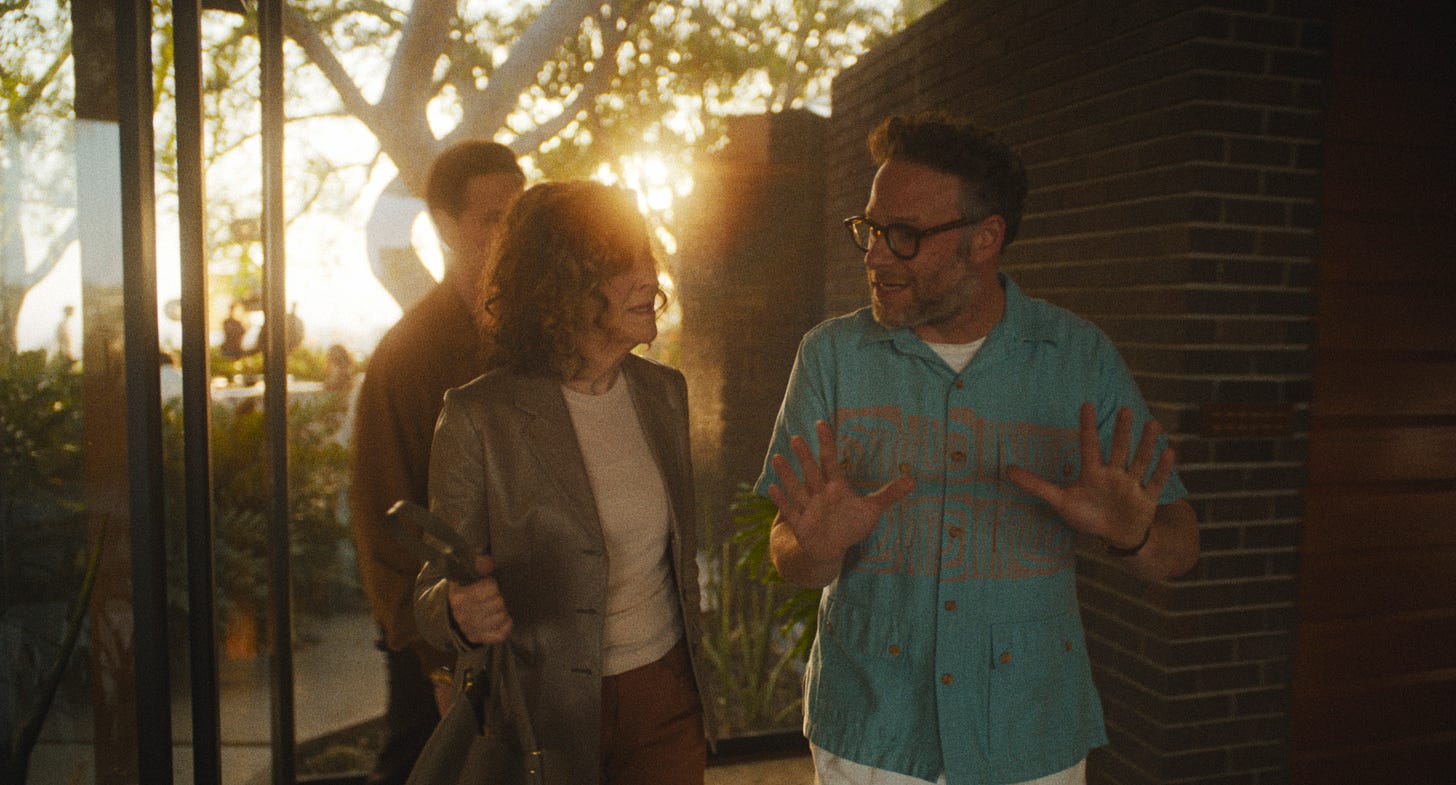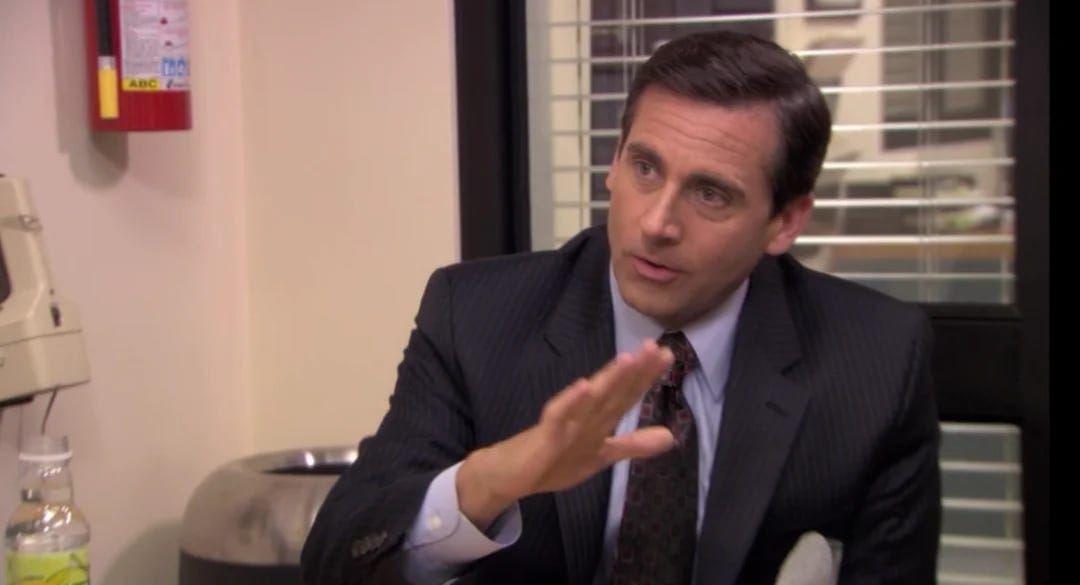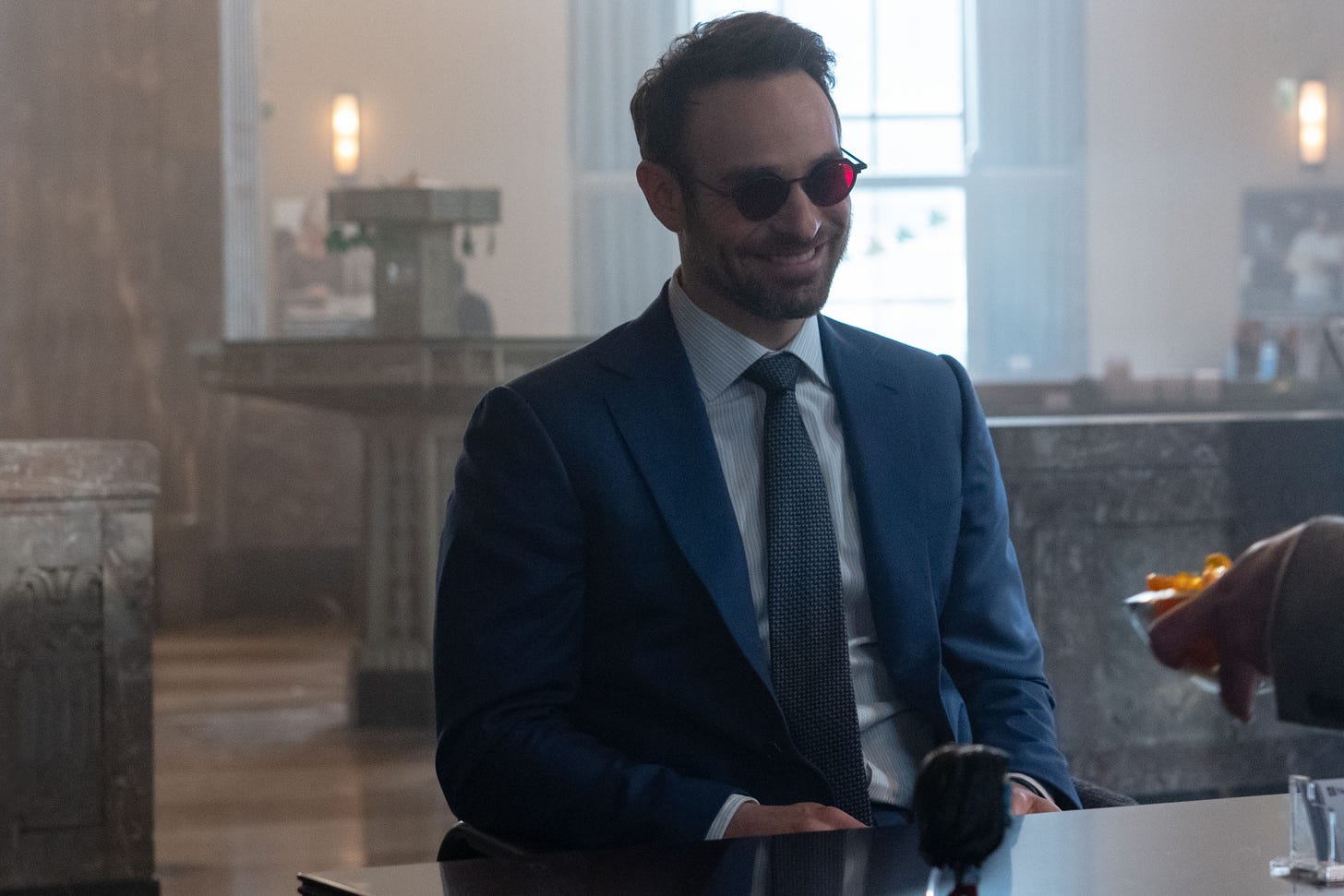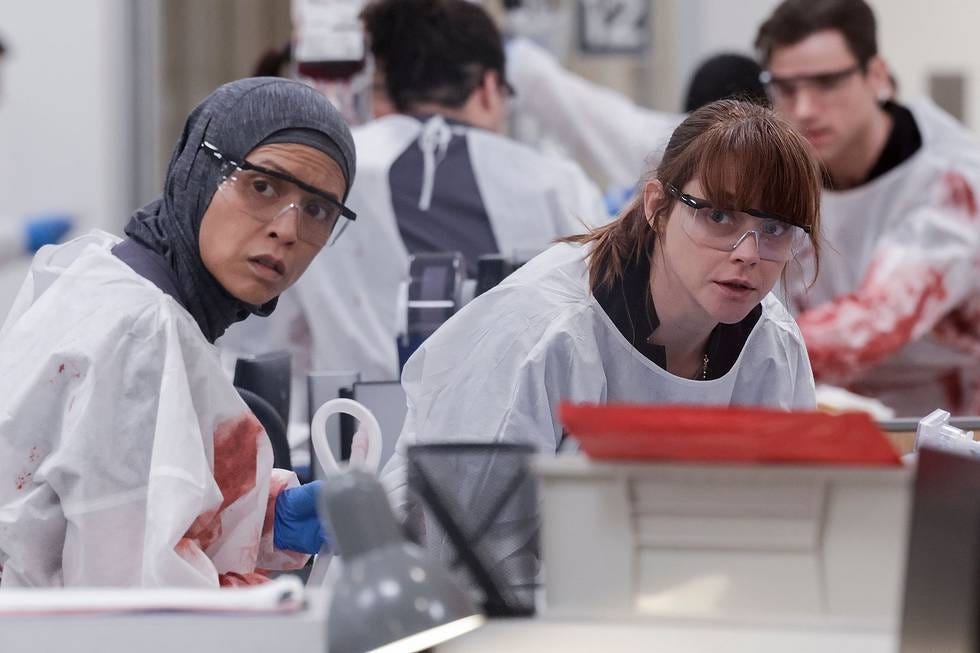'Studio' notes
Seth Rogen satirizes showbiz, 'The Office' turns 20, 'The Pitt' gives Noah Wyle his Emmy episode, 'Daredevil,' and more
This week’s What’s Alan Watching? newsletter coming up just as soon as I drill a hole into a clown…
A motion picture comedy
Sometimes, when I’m taking notes while watching screeners, I will jot down specific reasons why I feel something is or isn’t working. And sometimes, I will just write down things like, “Yeah, I like this show,” or, more simply, “HAHAHAHA.” I did a lot of both while watching all 10 episodes of Apple’s new Seth Rogen/Evan Goldberg showbiz comedy The Studio, which debuted earlier this week, and which I reviewed for Rolling Stone. Not all of it works, but when it clicks, it made me laugh at great length and volume in a way that very few recent TV comedies — even the ones I love — do these days.
One thing I’m curious about is that Bryan Cranston (you might know him best as the father of The Pitt star Taylor Dearden) has a recurring role as Griffin Mill, the studio executive that Tim Robbins played in Robert Altman’s immortal Hollywood satire The Player. Cranston is great, and does some astonishingly good physical comedy in the season’s concluding episodes. But Robbins is no slouch as a comic actor himself, and he’s already in the Apple TV ecosystem with Silo. Was he not available? Not interested? Or did Rogen and Goldberg decide that this would be a bridge too far, even with the character returning and every episode including a Player-style oner?
Also? One of the show’s sneaky strengths is how many actors-turned-directors — or, in the case of Martin Scorsese, directors who like to act — the show brings in. Sarah Polley quit performing 15 years ago, and she’s hilarious in the all-oner second episode. Ron Howard is great as always, and once again makes me wish he would occasionally take an acting job where he doesn’t play himself. Olivia Wilde is excellent. There are so many directors who used to perform that it feels like an untapped resource for a comedy like this to exploit. And now I want to see all of them return to their old profession from time to time.
That’s what she said… 20 years ago
Monday marked 20 years since the American version of The Office debuted on NBC. The pilot — a beat-for-beat remake of the debut of the Gervais/Merchant original Office — is pretty dire. I’ve told this story before, but I will never forget seeing Office showrunner Greg Daniels at a TCA party right after I’d seen the pilot. He asked what I thought, and I candidly said that the moment where Michael pretends to fire Pam — a funny, if uncomfortable, bit with David and Dawn in the British show — made me hate him. Daniels took a big step back and said, nervously, “Well, that’s not good!” Wisely, that’s the only episode he ever did that was a direct adaptation of the UK show. The first season has some excellent installments like “Diversity Day,” but it really took until the second season for Daniels and company to figure out how to properly tailor Michael to Steve Carell, rather than trying to shoehorn him into jokes more appropriate for Gervais.
If you’re feeling nostalgic, some links:
I wrote a ton about the show during its run, including recapping the great majority of the episodes. This piece from HitFix (RIP) from the week of the series finale sums up a lot of my feelings for The Office as a whole, in both its strengths and its flaws.
Rick Porter from The Hollywood Reporter recently spoke with most of the Season One writing staff about those early growing pains.
An oldie but a goodie: my Rolling Stone colleague Andy Greene penned an oral history of “Dinner Party,” which he, like many fans, considers the show’s best episode. (I respect it but have only had the nerve to watch it the one time.) That eventually led to Andy writing an excellent book about the entire series, which I highly recommend.
Inside (super)man
In my review of Daredevil: Born Again, I noted my pleasant surprise that the season’s fifth episode was an almost entirely self-contained Adventure of the Week story about Matt Murdock foiling a bank robbery — with, it turns out, the help of Ms. Marvel’s father, Yusuf Khan. It’s not that this was an epically great hour of television, but rather that it was entertaining, solidly-crafted, and the exact kind of thing I’ve been saying since all the Defenders-adjacent Netflix shows that Marvel should make more of, just to keep each season’s serialized stories from feeling too repetitive. Even though it seems to have been made by the showrunners who got fired and replaced, I hope Marvel will consider doing this more often with future shows.
That episode came out earlier this week, paired with another one that advanced lots of the year’s ongoing arcs, and that finally saw Matt finally putting his costume back on to go hunt the serial killer Muse. There’s a good fight scene between Daredevil and Muse, but I had a much better overall time watching the bank heist episode. (Based on the new showrunner’s comments about which episodes best reflect his contributions, as well as the fact that Disney felt compelled to release these two episodes in the same week, I suspect episode 5 was largely the work of the producers who got fired, and that the powers that be aren’t as happy with that one as I am, alas. But also, it’s funny that the original guys were fired in part because it took Matt four episodes to get into costume, and the new guy pushed it back to six — albeit by adding a costumed fight scene at the start of the season.)
Since we’ve now moved into the season’s second half, this seems as good a time as any to check in on how people are feeling. I thought my review would be among the more negative, but several others I saw earlier this month were actually harsher. Are people enjoying Born Again? Does it feel like enough of a throwback to the Netflix seasons? Too much?
Odds and/or ends
New this week on Netflix: Season Two of Survival of the Thickest, the deeply charming comedy co-created by and starring Michelle Buteau. The first season involved Buteau’s Mavis trying to rebuild her life after breaking up with her longterm boyfriend, and struggling to get her stylist business off the ground while working for a mercurial aging supermodel. The second season turns into more of a straightforward hangout comedy about Mavis and her best friends Khalil (Tone Bell) and Marley (Tasha Smith). There’s still some romantic intrigue involving Mavis’ hot Italian beau Luca, and a lot of Mavis and friends spending time at their local drag bar. (Peppermint from Drag Race is practically the fourth castmember this season.) Mostly, though, Survival of the Thickest understands that the appeal of Buteau, Bell, and Smith — both as a trio and off in their own individual stories — is the main selling point. I enjoyed the first season, but liked this one even more.
This week’s The White Lotus dealt with revelations and recriminations after everything that went on during the full moon festival. I recapped it here, and I remembered how to properly set up the Monday morning chat this time. This was the last episode I saw before writing my initial review of the season. I’m still mixed on it. There’s nothing as bad as the Imperioli/Abraham subplot from Season Two, but the pacing feels off, several subplots are badly underfed, and the three friends story is the only one that seems to be clicking in every scene. Six down, two to go.
Between The Pitt’s epic 12th episode, the Severance finale, and the fact that The Residence had only just released its entire season a few days earlier, there wasn’t any discussion of the Netflix comic mystery series — which I enjoyed a lot — here last week. So let’s try this again, since presumably interested people watched some or all of it over the weekend. As I said in my review, the mystery itself wasn’t always easy to follow, but the comedy worked well enough that I didn’t much care, and I found the reveal of the killer satisfying on both a plot and theme level. How did you all feel?
The Pitt recaplet: “Hour 13”
Many thoughts on the latest Pitt episode, where victims of the PittFest shooting kept flooding into the emergency department:
There are so many images from this episode and the one before that are going to be burned into my brain for a long time. But I think the one that may stay the longest is when Langdon’s delirious patient tries to grab the gun in his ankle holster, and everyone in the department either ducks in unison or — like Perlah — jumps on top of a patient to protect them from being shot again. As much as Robby and Abbott’s briefing at the start of last week’s episode, or Kiara and Lupe running through the very thorough procedures the hospital has devised to identify mass casualty victims, it’s inherently sad to see that these people have had to be so well-coached to handle a situation that just shouldn’t be allowed to happen, much less as often as it does. But it’s also inspiring to watch someone like Perlah instinctively think of her patient before herself.
We’ll see how much love Emmy voters shower on this series, given the presence of White Lotus, The Pitt, the upcoming return of The Last of Us, etc. I’m bracing myself for the idea that Noah Wyle will be the only actor nominated from the cast. But if that’s the case, my lord does he have a great submission episode with this one. Robby’s panic attack in the impromptu morgue — as well as his realization that a grief-stricken Jake needs to get out of the room before he witnesses too much of it and gets even more upset — was absolutely gutting. It was also very much earned from the way we’ve seen him struggling all shift, and how he can’t let go of Dr. Adamson’s death — including Robby’s decision to take him off the ECMO machine to give it to a little girl with a better chance of survival — in this very room. When he says that he’ll remember Leah’s death long after Jake has forgotten her, he’s obviously wrong, but he’s too wrapped up in his own PTSD to realize how cruel that sounds to this kid he cares about so deeply.
For that matter, the sequence where Robby begins violating the mass casualty plan right and left in a desperate attempt to save Leah, for Jake’s sake, is incredible. Everyone in the department knows it’s a lost cause — Langdon, McKay, and others keep looking over at him, clearly doing the mental math on how long the CPR has been going on for — and Abbott is trying very hard to not just yell at Robby to stop wasting time, manpower, and blood on a girl who’s not going to make it. The look Dana gives Abbott — “This isn’t working, and you have to come over here and try to put a stop to this” — is so powerful, and one of so many moments that makes me rooting for Katherine LaNasa to join Wyle (and hopefully Taylor Dearden) in the awards conversation.
This is an episode with a lot of cowboy medicine, where the doctors try risky procedures they’ve only read about in journals, or heard about on podcasts. Realistically, at least some of these should have failed — Santos doing the REBOA, most likely, because she’s the greenest and also the most overconfident. But the success rate worked for me for a couple of reasons. First, we don’t know about the long-term effects of these stunts, just that they stabilized each patient long enough to get them treated by other departments. When someone commends Mohan for saving the hippie by drilling a hole into his skull, Dr. Walsh mutters, “If he lives.” Second, it’s such a nightmarish day for everyone that it feels unfair to burden any of the doctors further by having them kill a patient with a procedure they shouldn’t have been doing. It feels like enough for them to have to endure it, and for some patients like Leah to die simply because they were too badly injured before they arrived at the hospital.
Similarly, I’m relieved that it doesn’t seem as if David was the shooter, at least not based on his behavior here. That would also be too much burden to place on Robby. Because there’s so much else going on in the episode, though, it feels like David’s arrival and arrest are given short shrift. We don’t see Robby or Mohan giving him an exam, or trying to talk to him, and then Robby leaves David behind altogether to give Jake the bad news. It’s more to juggle than the episode can fully handle, in the same way that Robby is being asked to do too much in his job.
Since his return, Langdon has seemed much more frantic and impulsive than before Robby busted him. It feels very much like he left the hospital and took some of his stolen pills. He’s a functioning addict, but just barely.
Chekhov’s Ankle Monitor: McKay’s device malfunctions again at the worst possible time. And since we know from earlier this season how long it takes her to get it turned off in this situation, we understand why she just grabs an IO drill to destroy the thing. She can’t spare the time to wait for the dispatcher to fix it, and the other doctors can’t afford to be distracted by the klaxon. (That said, rather than return immediately to a patient, McKay gives herself a brief break to check on Harrison and Chad.)
Like Dr. Shen at the end of last week’s episode, Whitaker asks when everyone thinks this ordeal is going to end. And it’s interesting to see how people are responding to such intense, prolonged stress in different ways. Mohan is very much getting into the frantic pace of the thing — it’s hard to imagine “Slo-Mo” drilling that burr hole without waiting for an attending — while Mel’s affect starts to get much more muted as the hour goes along, because this is so clearly exhausting.
That’s it for this week! What did everybody else think?







Mel, who’s been mostly great in this series, was really starting to crack under the pressure. I enjoyed watching everyone wear down differently but she keeps running for attending and leaving students to make hard decisions. And she seems so frazzled. Growing pains for my favorite doctor.
The anecdote about hating Michael Scott after the pilot is so appropo given the premiere of The Studio this week. The protagonist is spineless, inconsiderate, a serial liar, a meddler, and lacks any self-awareness... so yeah, I pretty much hate Matt after these first 2 episodes The problem isn't that he's a flawed antihero it's that Seth Rogen and company seem to believe Matt is a loveable, dream-chasing screw-up that the audience is supposed to root for. This dissonance seems like it'll be a huge problem for me because I generally like everything else about the show.